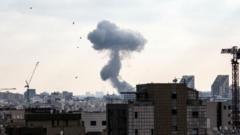As the geopolitical landscape shifts, the focus turns to potential repercussions and regional stability amidst escalating tensions.
**Rising Tensions in the Middle East: U.S. Strikes on Iran Prompt Responses Across the Region**

**Rising Tensions in the Middle East: U.S. Strikes on Iran Prompt Responses Across the Region**
U.S. military actions against Iranian nuclear facilities incite reactions from Gulf states and heighten fears of conflict.
June 22, 2025
The unfolding scenario in the Middle East has taken a critical turn following U.S. airstrikes targeting Iranian nuclear facilities, as regional stakeholders express unease regarding the increased potential for conflict. The strikes, which were characterized by U.S. officials as precise and deliberately targeted, aim to disrupt Iran's nuclear capabilities, but they have equally ignited fears of retaliation and broader military escalations.
In the aftermath of the offensive, Gulf nations hosting American military bases have issued restrained statements, voicing anxiety about the potential for Iranian retribution. Despite their strategic alliance with the U.S., countries such as Saudi Arabia and Qatar have called for measured responses and diplomatic resolutions rather than open conflict. The danger of becoming primary targets for Iranian retaliation due to their association with the U.S. actions weighs heavily on their political and military calculations.
Iranian officials harshly condemned the U.S. strikes, asserting their rights to defend national interests while dismissing calls from neighboring states for de-escalation. The leadership in Tehran characterized the attack as a significant threat to their sovereignty and security, expressing their resolve to respond with force if necessary. The Iranian Revolutionary Guards further emphasized the vulnerability of American bases within the region as potential targets in light of escalating tensions.
Meanwhile, the narrative within Israel has turned to newfound optimism in light of the military successes perceived from the strikes. Some Israeli citizens celebrate the prospect of diminished threats from Iran, particularly amid calls for increased military operations against Iranian assets. Conversely, a notable segment of the population fears a cycle of retaliation and a prolonged conflict that could destabilize the region even further.
While the U.S. asserts that the outcome of its strikes will safeguard its allies and the interests of global peace, doubts linger regarding the long-term efficacy of military engagement in resolving the complexities of Iran's nuclear ambitions. The situation remains fluid, and international diplomatic channels are poised to face the significant task of navigating through renewed hostilities and fostering possibilities for dialogue amidst ongoing crises.
With the specter of war looming, both regional and world leaders are now under considerable pressure to act decisively yet prudently, mindful of the potential ramifications of their strategies—hoping to avert another prolonged conflict in an already volatile landscape.
The unfolding scenario in the Middle East has taken a critical turn following U.S. airstrikes targeting Iranian nuclear facilities, as regional stakeholders express unease regarding the increased potential for conflict. The strikes, which were characterized by U.S. officials as precise and deliberately targeted, aim to disrupt Iran's nuclear capabilities, but they have equally ignited fears of retaliation and broader military escalations.
In the aftermath of the offensive, Gulf nations hosting American military bases have issued restrained statements, voicing anxiety about the potential for Iranian retribution. Despite their strategic alliance with the U.S., countries such as Saudi Arabia and Qatar have called for measured responses and diplomatic resolutions rather than open conflict. The danger of becoming primary targets for Iranian retaliation due to their association with the U.S. actions weighs heavily on their political and military calculations.
Iranian officials harshly condemned the U.S. strikes, asserting their rights to defend national interests while dismissing calls from neighboring states for de-escalation. The leadership in Tehran characterized the attack as a significant threat to their sovereignty and security, expressing their resolve to respond with force if necessary. The Iranian Revolutionary Guards further emphasized the vulnerability of American bases within the region as potential targets in light of escalating tensions.
Meanwhile, the narrative within Israel has turned to newfound optimism in light of the military successes perceived from the strikes. Some Israeli citizens celebrate the prospect of diminished threats from Iran, particularly amid calls for increased military operations against Iranian assets. Conversely, a notable segment of the population fears a cycle of retaliation and a prolonged conflict that could destabilize the region even further.
While the U.S. asserts that the outcome of its strikes will safeguard its allies and the interests of global peace, doubts linger regarding the long-term efficacy of military engagement in resolving the complexities of Iran's nuclear ambitions. The situation remains fluid, and international diplomatic channels are poised to face the significant task of navigating through renewed hostilities and fostering possibilities for dialogue amidst ongoing crises.
With the specter of war looming, both regional and world leaders are now under considerable pressure to act decisively yet prudently, mindful of the potential ramifications of their strategies—hoping to avert another prolonged conflict in an already volatile landscape.























